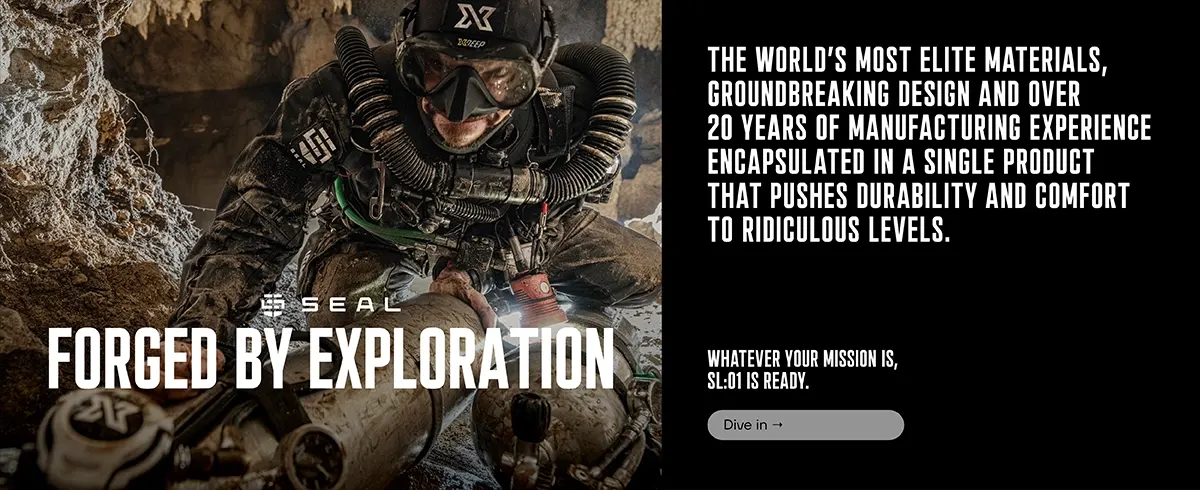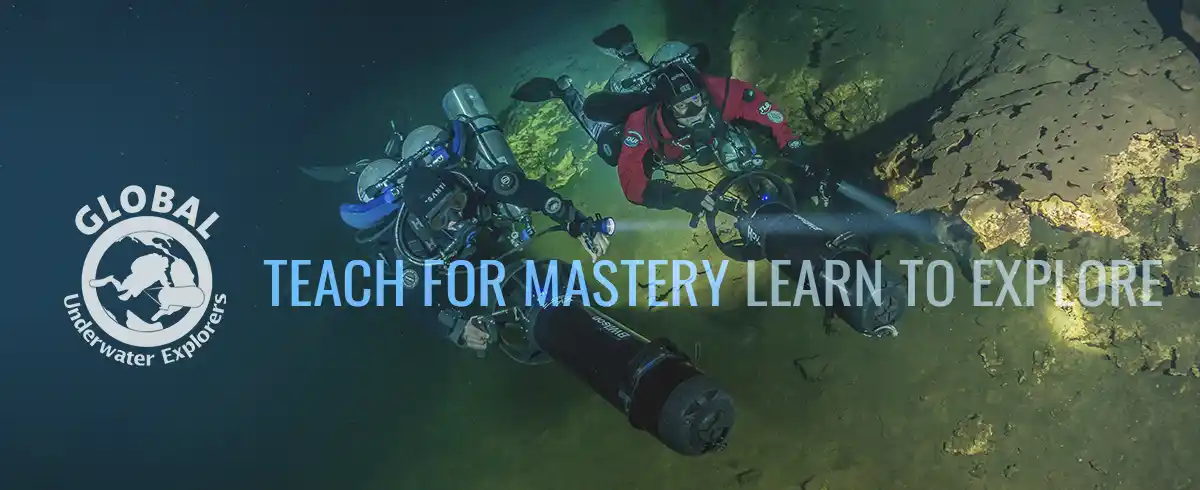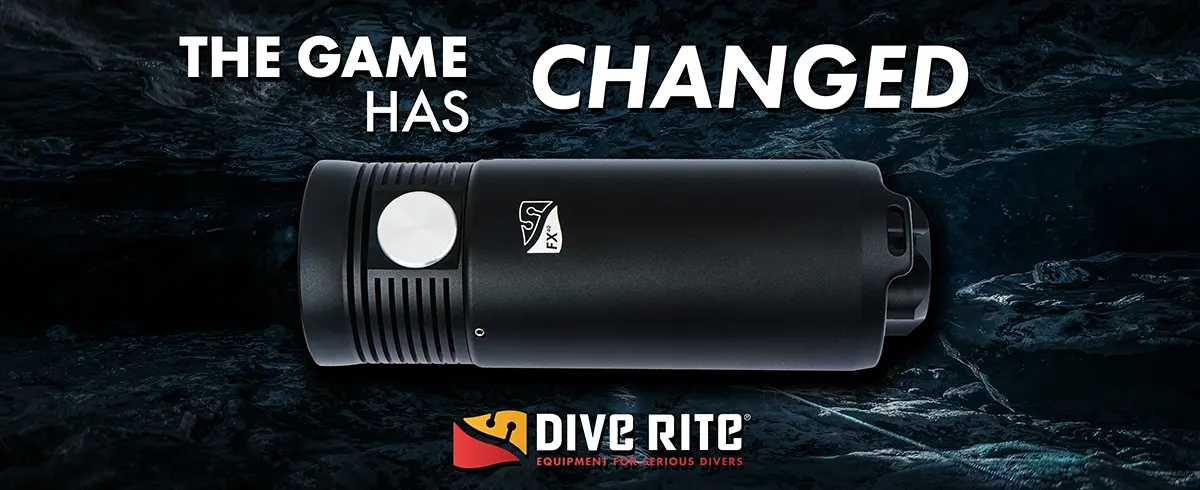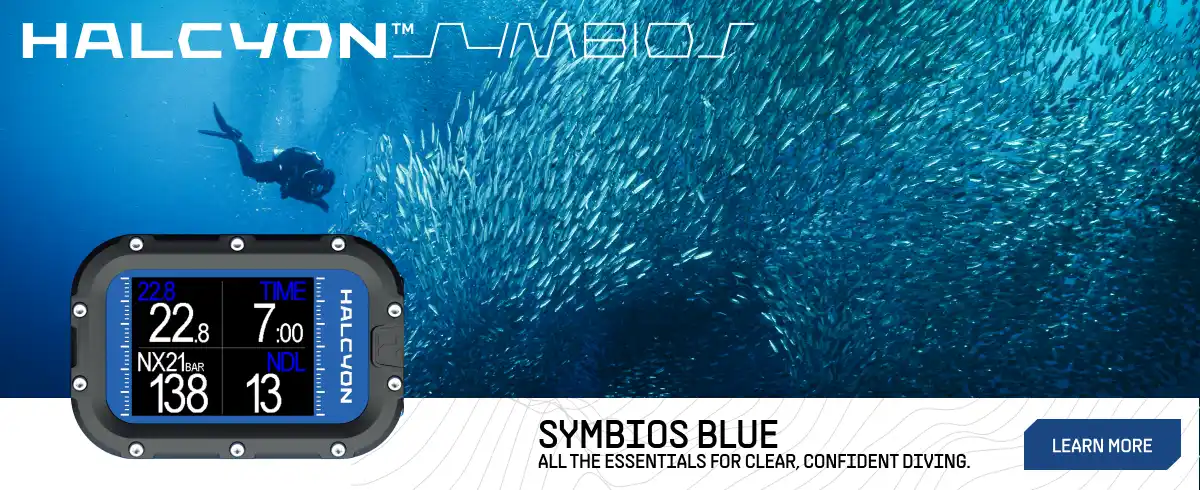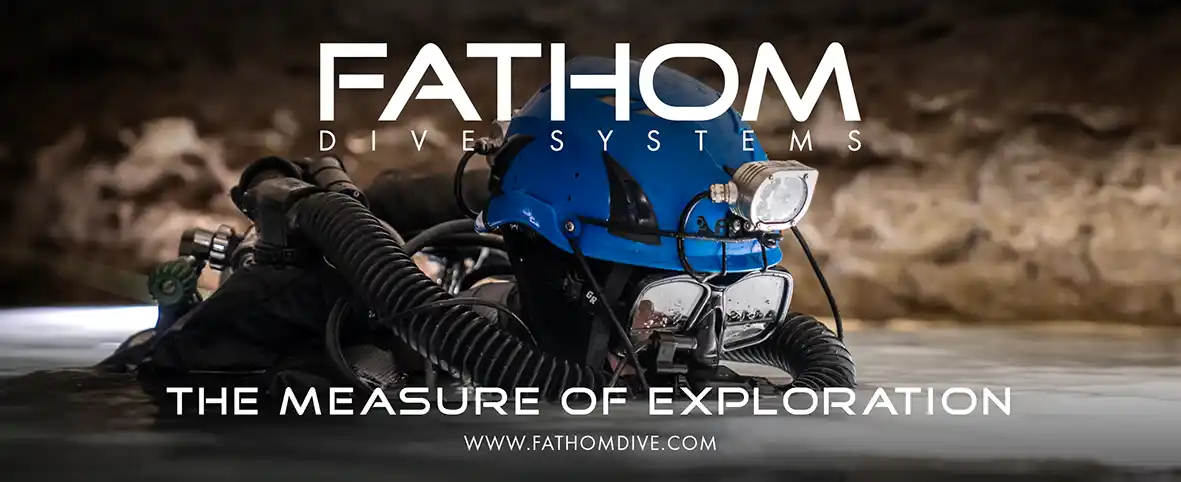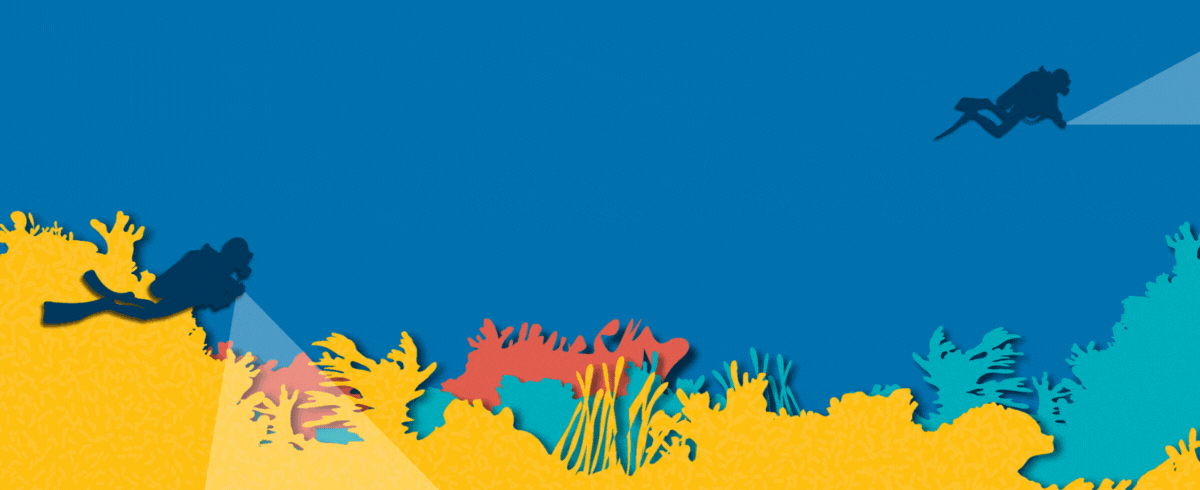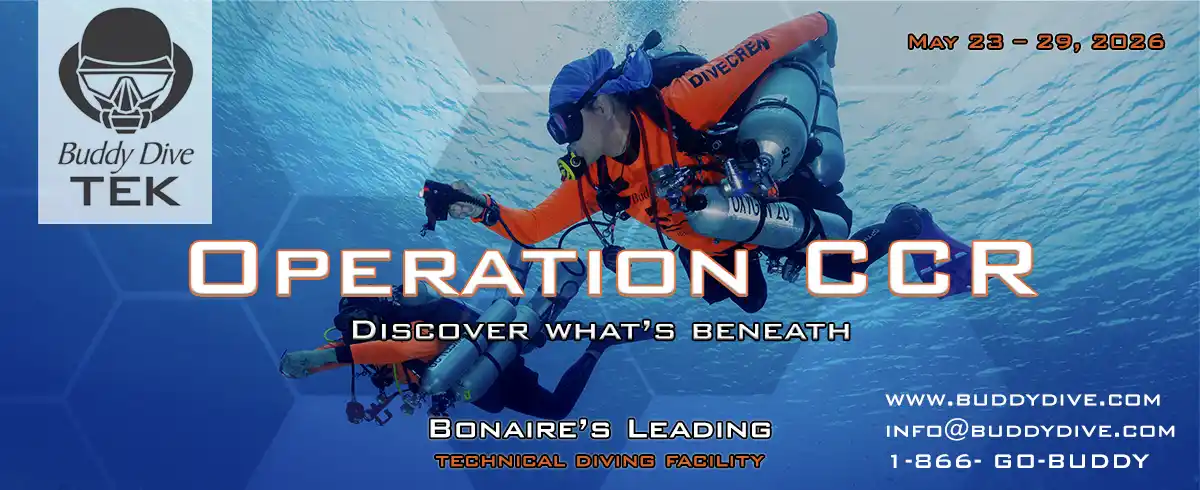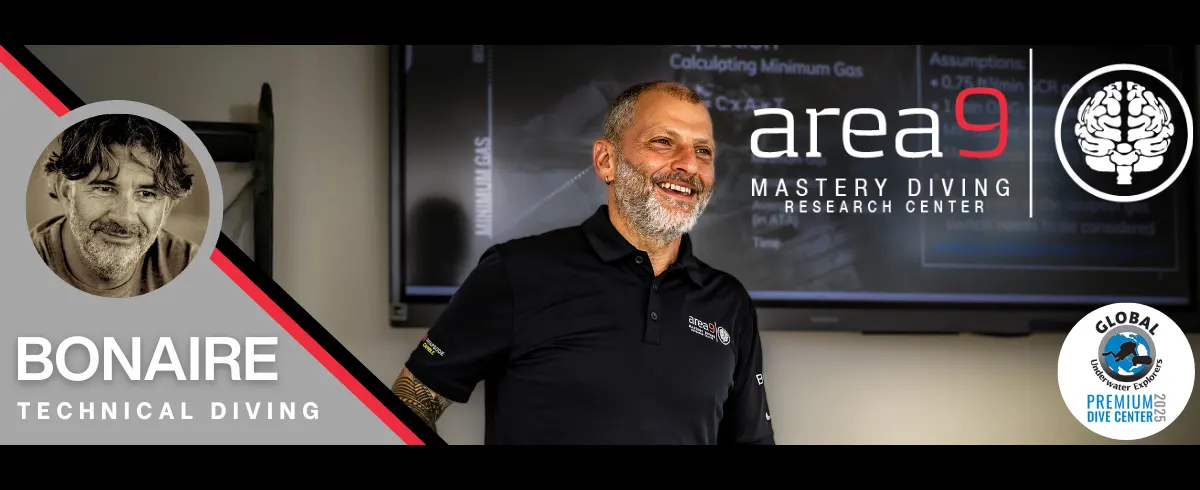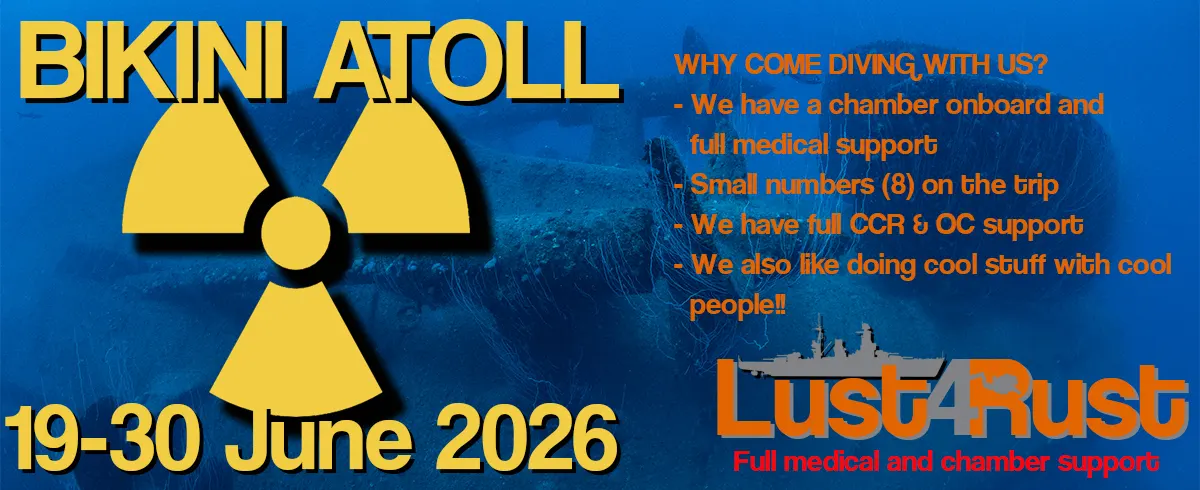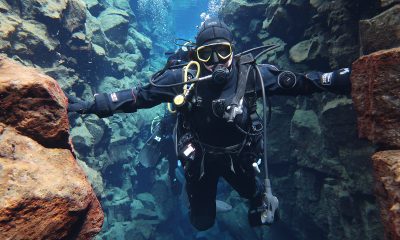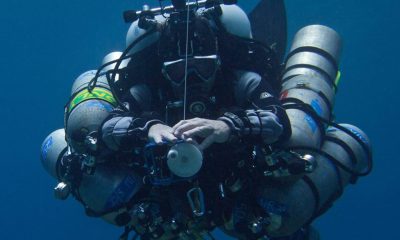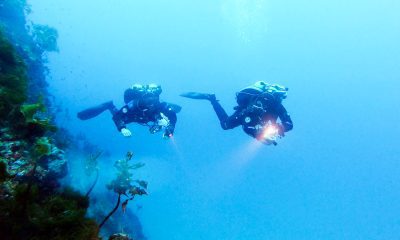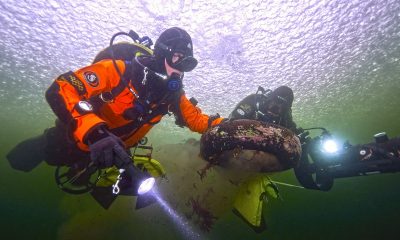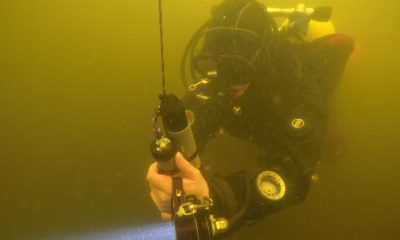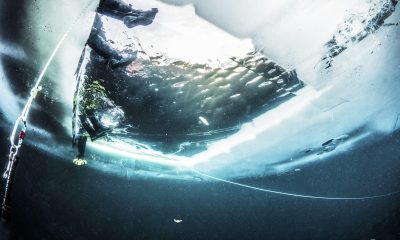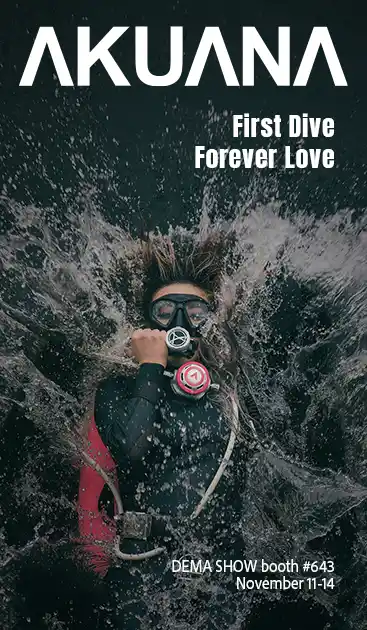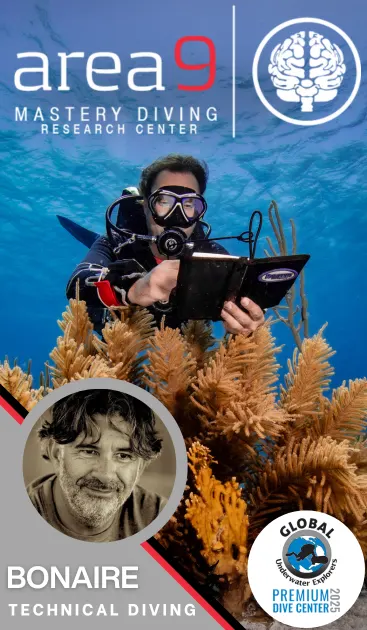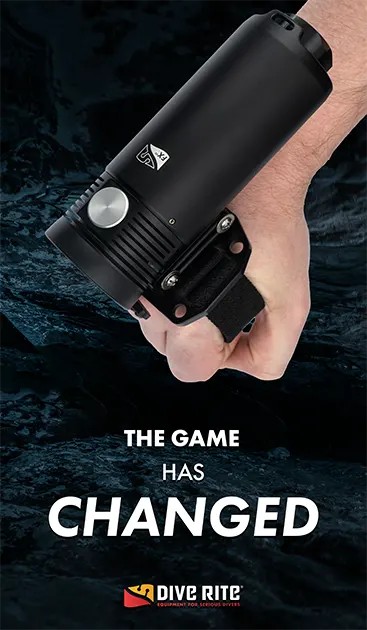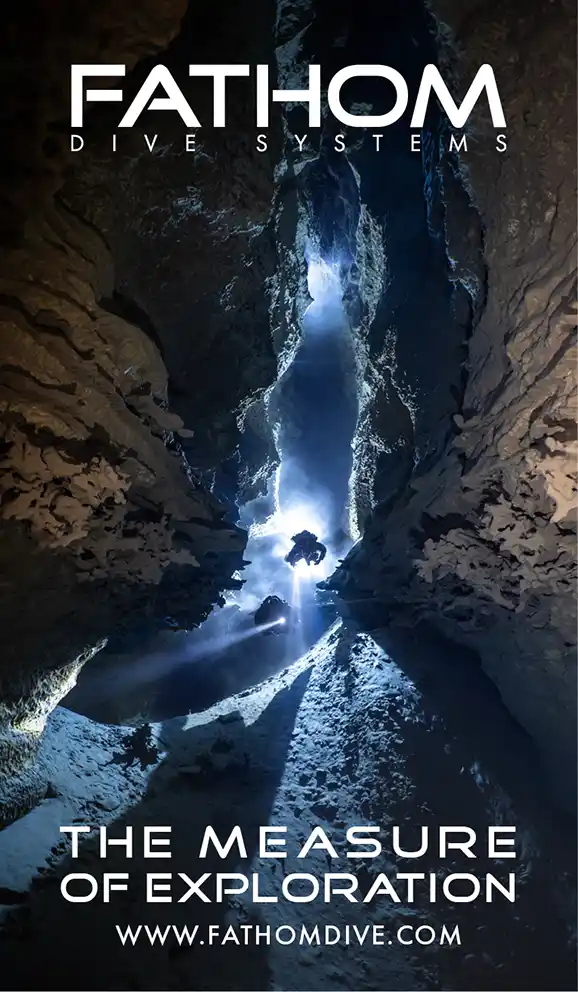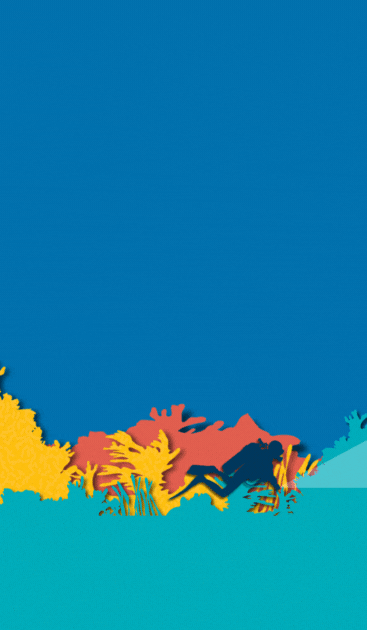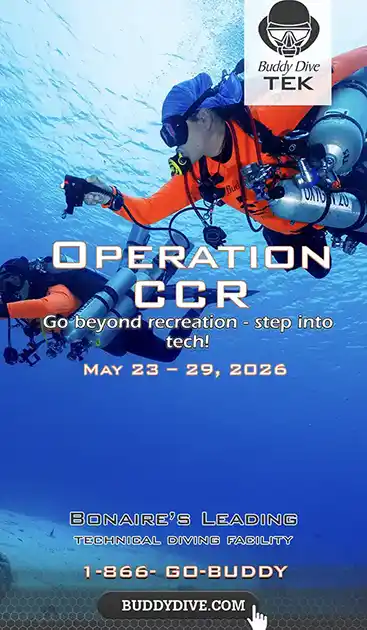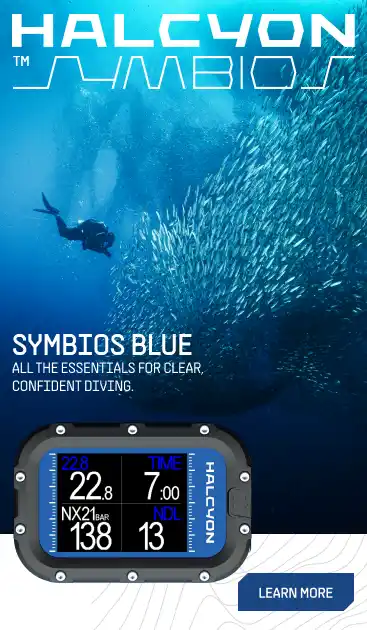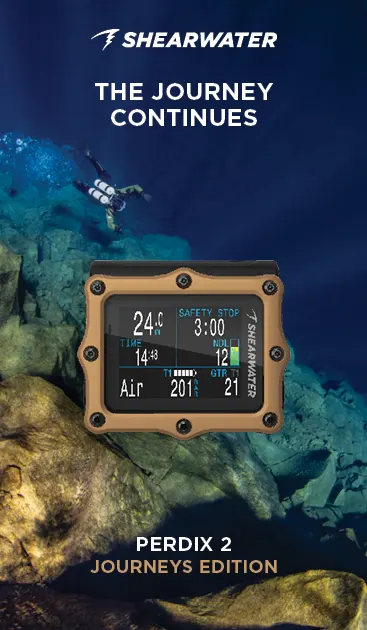Diving Safety
Returning To Diving After A Concussion
When and how should you return to diving following a traumatic brain injury? GUE’s NextGen Scholar, Kiwi water woman Annika Andressen spent eight months figuring out the answers to those questions with the help of Dr. Simon Mitchell, after suffering a concussion while surfing. Here is her tale of sloggin’ the noggin.
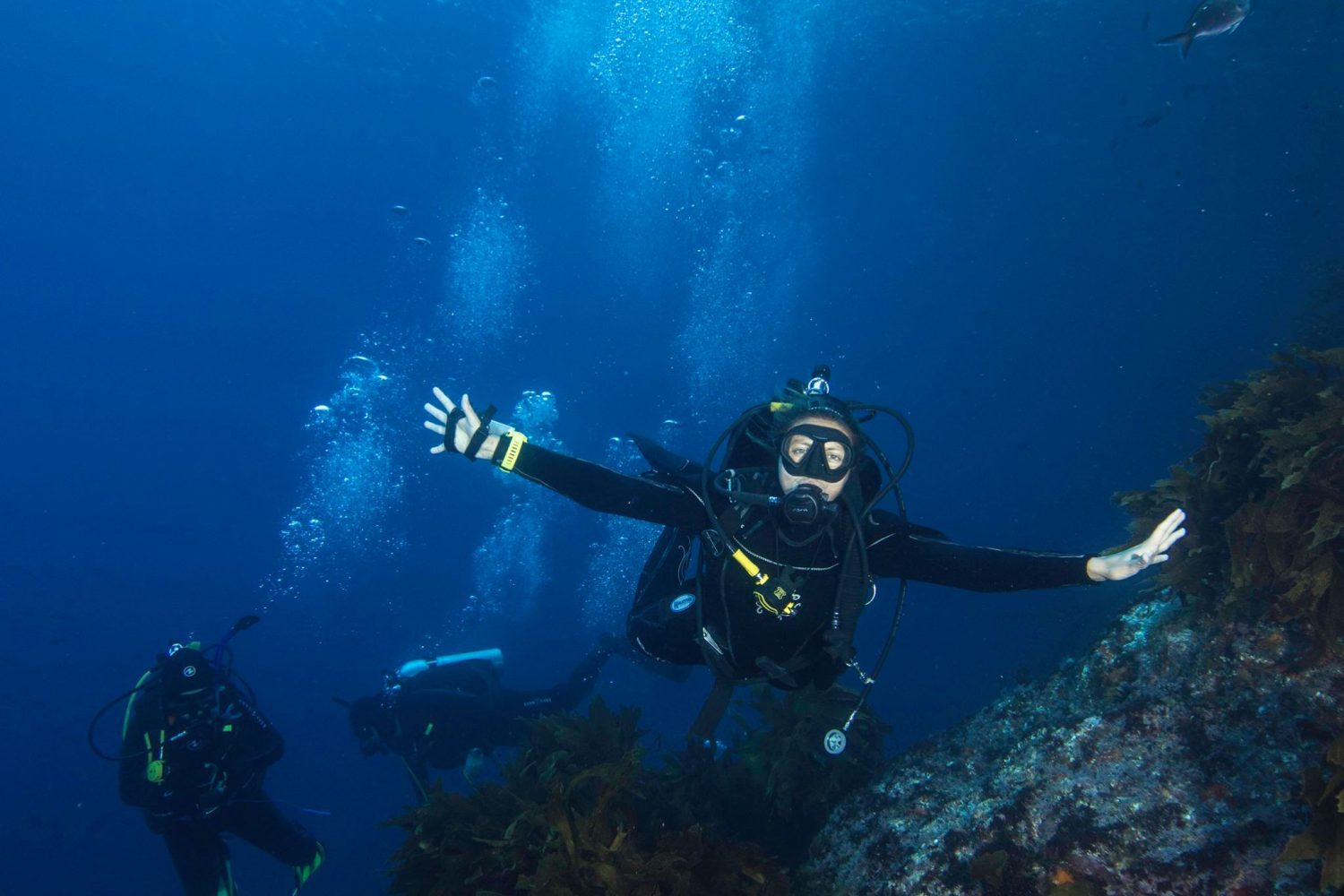
by Annika Andresen
Header image courtesy of Jack Austin, Dive Tutukaka . Other photos courtesy of A. Andresen unless noted.
It’s pretty safe to say that 2020 wasn’t the year anyone was expecting.
You might have read on my social media recently that I have been cleared to dive! Eight months ago I experienced a concussion from a surfing accident. It’s been a long (and, at times, really frustrating) recovery as I learned how to let myself rest, but one of my biggest questions was, “How will this affect my diving?”
So I thought I would share my journey over the last eight months, including my injury, my rehabilitation, and things to be aware of when returning to diving.
Here in New Zealand, we had a quick government response toward COVID, going into an immediate one-month lockdown and another further three weeks under tight restrictions, and initially, New Zealand successfully stamped out the virus. The first weekend out after restrictions eased, there was an awesome east coast swell and I was dying to get back in the water. My boyfriend Josh and I met one of my best friends up north before heading out to the coast to catch some waves.
I will be the first to admit that the waves were quite steep and bigger than I was used to. As I stood up on my first wave, I fell forward over my board and into the water. As the wave crashed over me, the water slammed my head into the seafloor below, catching the sand bottom beneath my chin. At the same time, my board had flung around, and the rail of the board hit the back of my head, breaking the fiberglass.
Despite this, I was feeling quite relaxed knowing I could hold my breath for over three minutes. I thought to myself, “Ouch that hurt,” but then waited patiently for the wave to pass before coming to the surface. As I stood up in the surf, I felt slightly dizzy but not bad enough to put me off surfing. I signalled to Josh to keep an eye on me and I went back out to catch the next wave. Learning my lesson from before, I stayed in the white water, enjoying the freedom of being in the ocean. An hour later, we returned to the beach for a hot shower and headed home. It wasn’t until I woke the next morning that I realized something was wrong.
It felt like I had the worst hangover. My head felt like it was in a clamp that was crushing my brain. The room was spinning, and I struggled to walk, using the walls to support me. Later that day, I called one of my best friends to ask what I should do, and she urged me to go to the A&E (accident and emergency facility). There, the doctors diagnosed a concussion.
After a week off work, the vertigo and the clamp-crushing head pain had stopped, but I still had a constant headache, and my heart rate was all over the place. I walked to the top of my driveway and my heart rate peaked at 180bpm. I realized then that this wasn’t going to be an overnight fix.
What Is A Concussion?
A concussion is a type of traumatic brain injury caused by a bump, blow, or jolt to the head or a hit to the body that causes the head and brain to move rapidly back and forth. This sudden movement can cause the brain to bounce around or twist in the skull, creating chemical changes in the brain and sometimes stretching and damaging brain cells.
In the months following the injury, despite not having any alcohol, I felt like I had a constant hangover. A team from Advanced Personnel Management (APM) took on my case to help me recover while easing back into work. The biggest shock was my initial assessment at the physio. The first test: walk across the room and pick up a pen on the floor on the way. Easy right? Well, as soon as I tried to pick the pen up and stand up, I immediately fell over. The second test involved my having to follow the doctor’s pen with my gaze as he moved it back and forth in front of my eyes. Also easy right? I didn’t realise it, but my physio said I blinked constantly as I tried to follow the pen. This was because my brain couldn’t process all the information, and the blinking was a coping mechanism to give my brain a break.
Through these tests, I found I had lost all my balance, eye tracking was difficult, and the ability to process information decreased significantly. I couldn’t articulate my thoughts and had trouble speaking. My hearing was impacted, as I couldn’t tolerate any loud sounds or multiple people speaking, and I wasn’t able to regulate my heartrate: all as a result of a concussion. Being in a car at night-time when it was raining was my worst nightmare—moving bright lights and fast windshield wipers were not a good combination.
To assist my recovery, the team at APM gave me a pair of fancy earplugs, blue light glasses, and some exercises to do. The hardest part was to get the balance right between rest and activity, while letting my brain recover. If you know me, you will know I am not great at prioritising rest. I eased back into my work as an educator, starting with two hours, then four hours, and slowly getting to half days in schools. Loud classrooms and VR headsets proved a challenging setting, but the struggles were balanced by the fantastic support I had from the BLAKE team. I also found afternoon naps to be amazing!
Four months after the injury, I was able to work a full day, and my headaches were intermittent, only increasing if I did too much exercise or didn’t get enough rest. But then I wanted to see if I was able to get back in the water. This period had been my longest time out of the water since I learned to dive in 2013.
Diving After A Concussion?
I am no doctor and, to be honest, I really had no idea about the risks associated with scuba diving after a concussion, so I reached out to Dr. Simon Mitchell to hear his thoughts. For those who don’t know him, Dr. Mitchell, is an incredible physician specialising in occupational medicine, hyperbaric medicine, and anaesthesiology, as well as being someone who is highly respected in the global diving community. He has a Wikipedia page and received the Rolex Diver of the Year Award in 2015. I felt so honoured that he emailed back and agreed to catch up. Trying not to be a fangirl, I was grateful for the facemask hiding my massive smile and excitement as I met Simon outside Auckland Hospital.
We discussed my injury and the symptoms associated with my concussion. I had not lost consciousness nor had I experienced any amnesia; therefore, my injury was classified as a mild concussion. Injuries with a loss of consciousness for 30 minutes to 24 hours or a skull fracture are considered moderate. Severe concussions are injuries that include loss of consciousness or amnesia for more than 24 hours, subdural hematoma, or brain contusion. I consider myself very lucky that my concussion was only mild.
There is little known about concussions, and research in this area is difficult, as every injury is so different. Although Simon explained that one of the major risks for scuba diving after a concussion was an increased risk of seizures, this risk varies according to the severity of the traumatic brain injury and is reflected in the correlation between trauma and seizures.
We did a couple of tests, focusing on my balance by standing with one foot in front of the other, with my hands on my shoulders, and with my eyes closed for one minute. I had been practicing my physio exercises every day and was stoked that I completed the one minute without falling over!
Despite having only a mild concussion, there was still a small increased risk of a seizure. Simon acknowledged that no one can ever guarantee that there will be no problems, so I accepted the unknown (but almost certainly small) degree of increased risk, and Simon gave me some advice to help me ease back into diving.
The first precaution was to understand which gas I was breathing. Increased partial pressures of oxygen can be known to increase the risk of seizures; therefore instead of diving nitrox, diving with air at 21% oxygen was recommended while I eased back into diving. Avoiding physical exertion and task loading on a dive—swimming into a strong current, instructing and guiding diving, or any activities that would raise my heart rate and increase symptoms—was also suggested. And finally, Simon’s last piece of advice was not to push depth for the first couple of months; instead to stick to open water dives (shallower than 18 m/60 ft).
But this meant I could dive again!!! And I was very, very excited about this. We concluded our catch up with epic diving stories and some amazing photos that Simon had taken on his incredible journeys on different diving expeditions.
Cleared to Dive!
Being cleared to dive, I eagerly called a couple of my friends and asked if they would join me for my first dive back. We chose to dive at Goat Island, New Zealand’s first marine reserve, and where my open water course was held.
We hit a maximum depth of 5 m/16 ft for an hour as I enjoyed being back in the water, chasing fish, looking for crayfish, and following Steph’s trusty navigation. It was so good to get back in the water, just in time for summer.
It has been three months since my first dive back in the water. If you follow my social media, you will know that over the summer, every spare minute I have is normally spent being on or in the water. I have been very lucky to have two weeks off work where I got to explore unfamiliar territory in the cooler waters of Waihau Bay, the most eastern part of New Zealand. And, although I wasn’t scuba diving there, it was great for freediving practice and just being back in the water. The second week of my holidays was spent in my favourite place up north in the sunny Tutukaka, where I have been able to scuba dive as much as I can while sticking to Simon’s advice and slowly increasing my depth.
For the first couple of months, I limited my dives to a maximum depth of 18 m/60 ft, avoiding physical excursion. During the last couple of weeks I have been increasing my depth limit to 30 m/98 ft, constantly monitoring how I am feeling and if any symptoms recur. I have been ensuring as well to make sure I drink plenty of water and allow for more rest and sleep than usual, both before and after diving.
Last weekend was a great test to see how I was after a full weekend of diving at the Mokohinau Islands. I completed four dives, my longest being 71 minutes, and loved every moment of it! We saw bronze whaler sharks, pilot whales, dolphins, a baby octopus, a little blue cod (unusual for this area), hundreds of schooling koheru, and a silver and yellow bait fish. The excitement I felt and the smiles on my face didn’t stop the whole weekend.
My next step in the next couple of months is to start diving with nitrox and work towards more technical diving later on in the year. Hopefully, by that stage, I will be able to travel and will be ready to take Global Underwater Explorers (GUE) Tech 1 and Cave 1 courses.
This is my own personal account of my injury. I wanted to share my experience and some scuba diving precautions after a concussion. If you have had a traumatic brain injury, no matter how slight, be sure to seek medical advice and clearance before returning to diving.
Dive Deeper:
You can follow Annika’s blog here.
InDepth: Jumping into the Deep End by Annika Andresen
InDepth: Meet GUE’s NextGen Scholarship Winner

GUE’s first NEXTGen scholar, Annika Andresen is a virtual reality environmental educator for BLAKE NZ, connecting thousands of young Kiwis with their marine environment. Annika holds a Master of Architecture degree, where her thesis investigated the role architecture plays on the connection people have with their environment. During her studies, Annika worked as a dive instructor for Dive! Tutukaka, and was the President of the Auckland University Underwater Club. Annika has just been awarded the New Zealand Women of Influence Youth Award for 2019. Using her natural enthusiasm and infectious personality, Annika hopes to educate others to understand and cherish our unique environment and to better protect it for the years to come.

